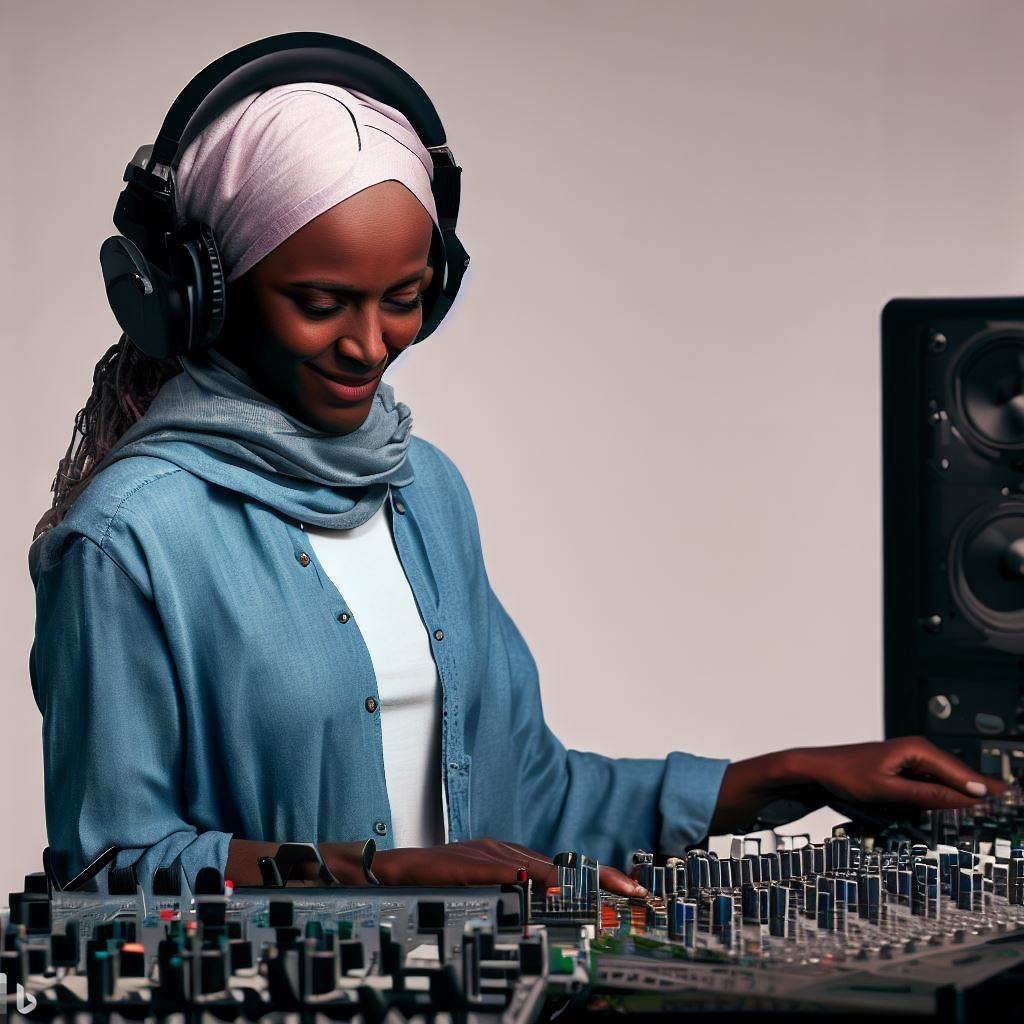Introduction
The role of a mixing engineer is crucial in creating a professional and polished sound for music productions.
In today’s competitive music industry, having the right gear is essential for Nigerian mixing engineers to excel in their craft.
Nigeria’s music industry has experienced tremendous growth in recent years, becoming the powerhouse of African music.
With talented artists such as Burna Boy and Wizkid gaining international acclaim, the demand for high-quality mixing engineers has increased significantly.
This blog post aims to provide Nigerian mixing engineers with a guide on the essential gear they need to deliver exceptional results.
By investing in top-notch equipment, engineers can enhance their skills and elevate their work to another level.
From studio monitors and headphones to audio interfaces and plugins, we will explore the gear that every Nigerian mixing engineer should consider.
We will delve into the importance of accurate monitoring, versatile plugins, and the benefits of using high-quality microphones and preamps.
By equipping themselves with the right tools, Nigerian mixing engineers can ensure the best possible sound quality for their clients.
This guide will help them navigate the vast array of gear options available in the market, making informed decisions about their investments.
In the end, the success of Nigerian mixing engineers relies heavily on the quality of their gear.
This blog post will serve as a valuable resource, offering insights and recommendations to enhance their professional capabilities.
Stay tuned for the next sections, where we will dive deeper into the specific gear categories.
Studio Monitors
A. Importance of accurate and reliable studio monitors
In order to achieve high-quality sound mixes, Nigerian mixing engineers must invest in essential gear that includes reliable studio monitors.
Studio monitors play a crucial role in accurately reproducing sound, allowing engineers to make precise adjustments and create professional mixes.
Studio monitors are essential for mixing engineers as they provide accurate and unbiased sound reproduction.
They help identify any flaws or inconsistencies in the mix, ensuring that the final output sounds great on various playback systems.
B. Recommended brands/models suitable for Nigerian mixing engineers
When it comes to choosing suitable studio monitors, Nigerian mixing engineers have a wide range of options.
Some recommended brands/models that have proven to be reliable and suitable for Nigerian professionals include:
- Yamaha HS Series: Known for their flat frequency response and clarity, HS series monitors are a great choice for Nigerian mixing engineers.
- KRK Rokit Series: These monitors offer a balanced sound profile, making them suitable for a wide range of musical genres.
- Adam Audio A7X: Highly regarded for their exceptional accuracy and detailed sound reproduction, A7X monitors are favored by many professionals.
C. Factors to consider when selecting studio monitors
When selecting studio monitors, there are several factors that Nigerian mixing engineers should consider:
- Frequency Response: Look for monitors that have a flat frequency response to ensure accurate representation of the mix.
- Transparency: Choose monitors that provide a transparent and uncolored sound, allowing you to hear the mix accurately.
- Power and SPL: Consider the power and sound pressure level (SPL) of the monitors to ensure they can handle the volume required for your mixing sessions.
- Room Acoustics: Take into account the acoustics of your mixing room and choose monitors that suit the size and shape of the space.
- Budget: Set a budget and find monitors that offer the best value within your price range.
It’s also worth considering whether active or passive studio monitors are preferred. Active monitors have built-in amplifiers, making them easier to set up and use.
Passive monitors require external amplifiers but offer more flexibility for customization.
In fact, reliable studio monitors are essential for Nigerian mixing engineers to achieve accurate and professional sound mixes.
Brands such as Yamaha, KRK, and Adam Audio offer suitable models, but it’s important to consider factors like frequency response, transparency, power, room acoustics, and budget when making a selection.
By investing in the right studio monitors, Nigerian mixing engineers can elevate their mixing skills and deliver exceptional sound quality.
Read: The Impact of Technology on Mixing Engineering in Nigeria
Digital Audio Workstation (DAW)
A Digital Audio Workstation (DAW) is a software application used by mixing engineers to record, edit, and mix audio files.
It is an essential tool in the modern music production process.
A. What a DAW is and its significance in mixing
A DAW provides mixing engineers with a virtual studio where they can manipulate and enhance audio tracks.
It allows them to work with multiple tracks simultaneously, apply effects, and control various parameters to create a well-balanced mix.
Furthermore, a DAW offers a wide range of editing tools, including cut, copy, paste, and fade, making it easier for mixing engineers to shape the sound and achieve the desired outcome.
It also provides real-time visualization of waveforms and allows precise control over volume levels, panning, and automation.
A DAW’s flexibility and versatility enable mixing engineers to experiment with different ideas and approaches, creating unique sonic experiences.
It enhances workflow efficiency and streamlines the entire mixing process, saving time and effort.
B. Popular DAWs used by Nigerian mixing engineers
Nigerian mixing engineers have a variety of DAWs to choose from, depending on their preferences and budget.
Some of the popular DAWs used in the Nigerian music industry include:
- Ableton Live
- Pro Tools
- FL Studio
- Logic Pro
- Studio One
- Cubase
These DAWs have been widely adopted by Nigerian mixing engineers due to their ease of use, comprehensive features, and compatibility with industry-standard plugins.
C. Key features to look for when choosing a DAW
When selecting a DAW, Nigerian mixing engineers should consider the following key features:
- User Interface: It should have a clean and intuitive interface that allows for easy navigation and quick access to essential tools.
- Audio Quality: Look for high-resolution audio capabilities and support for different audio file formats.
- Compatibility: Ensure that the DAW works seamlessly with external hardware devices, virtual instruments, and plugins.
- Flexibility: The DAW should support a wide range of editing and mixing techniques, offering flexibility in creating unique soundscapes.
- Workflow Efficiency: Look for features like drag-and-drop functionality, keyboard shortcuts, and customizable interfaces to improve productivity.
- Updates and Support: Regular software updates and reliable customer support are essential to ensure a smooth and reliable mixing process.
Overall, choosing the right DAW is a personal decision that depends on individual preferences, budget, and specific requirements.
It is crucial to test different DAWs and find the one that best suits the needs and creative style of the Nigerian mixing engineer.
By harnessing the power of a DAW, Nigerian mixing engineers can unlock their full potential and create professional-quality mixes that captivate listeners and elevate the overall music production.
Read: The Journey of a Song: From Recording to Mixing in Nigeria
Audio Interface
A mixing engineer’s toolkit is incomplete without a reliable audio interface. This piece of gear plays a crucial role in connecting various equipment to a computer, ensuring pristine audio signals and efficient workflow.
When choosing an audio interface, Nigerian mixing engineers should consider several factors.
A. Role of an Audio Interface in Connecting Equipment to a Computer
- Converts analog audio signals into digital format that can be processed by the computer.
- Provides high-quality A/D and D/A converters for accurate audio reproduction.
- Serves as a hub for connecting microphones, instruments, and other audio gear to the computer.
- Allows for monitoring audio signals in real-time, ensuring accurate mixing decisions.
- Enables seamless integration with digital audio workstations (DAWs) for recording, editing, and mixing.
B. Recommended Audio Interfaces for Nigerian Mixing Engineers
- Focusrite Scarlett 2i2: A compact and affordable interface with high-quality preamps and intuitive controls. Perfect for home studios and on-the-go setups.
- PreSonus AudioBox USB: Offers excellent sound quality, rugged build, and easy-to-use software. Ideal for both beginners and professionals.
- Universal Audio Apollo Twin MkII: Provides top-notch sound, real-time UAD processing, and extensive plug-in options. Suited for demanding professionals.
- RME Babyface Pro: Features pristine audio quality, low latency, and versatile connectivity options. Well-suited for both studio and mobile setups.
- Antelope Audio Zen Tour: Offers exceptional sound, advanced DSP effects, and ample I/O options. Ideal for professional studios and live sound applications.
C. Factors to Consider When Selecting an Audio Interface
When choosing an audio interface, Nigerian mixing engineers should keep the following factors in mind:
- Connectivity: Ensure that the audio interface has sufficient inputs and outputs to accommodate your equipment.
- Preamp Quality: Look for interfaces with high-quality preamps to capture and amplify audio signals accurately.
- Sample Rate and Bit Depth: Consider the required sample rate and bit depth for your projects to ensure optimal audio quality.
- Compatibility: Check for compatibility with your operating system, DAW, and other software tools.
- Latency: Choose an interface with low-latency performance to avoid audio delays during recording and monitoring.
- Portability: If you need to work on the go, consider the size, weight, and bus-powered options of the audio interface.
- Budget: Determine your budget and find an interface that offers the best value for your money.
By considering these factors and choosing a suitable audio interface, Nigerian mixing engineers can ensure reliable and high-quality audio recordings, mixes, and productions.
The audio interface serves as a crucial link between the analog and digital worlds, facilitating creativity and achieving professional results.
Read: Challenges and Triumphs of a Mixing Engineer in Nigeria
Microphones
Microphones are a crucial component for Nigerian mixing engineers as they play a key role in capturing high-quality sound.
A. Importance of high-quality microphones in capturing sound
High-quality microphones are essential for capturing sound accurately and with minimal distortion.
They allow mixing engineers to capture the full range of frequencies, resulting in clearer and more professional audio recordings.
Using low-quality microphones can lead to muffled sound and loss of details, negatively impacting the overall quality of the mix.
Investing in high-quality microphones is crucial to ensure professional and impressive sound recordings.
B. Types of microphones commonly used by Nigerian mixing engineers
- Dynamic microphones: These microphones are rugged, versatile, and suitable for capturing vocals and instruments with high sound pressure levels.
- Condenser microphones: These microphones are more sensitive and capture sound with great detail, making them ideal for recording vocals and acoustic instruments.
- Ribbon microphones: These microphones are known for their warm and smooth sound reproduction, making them suitable for capturing instruments such as guitars and brass sections.
- Lavalier microphones: These small clip-on microphones are commonly used in live performances and interviews, providing hands-free operation and discreet sound capture.
- Shotgun microphones: These highly directional microphones are designed to capture sound from a specific direction, making them ideal for location recordings and film productions.
C. Factors to consider when choosing a microphone for different applications
- Frequency response: Choose a microphone with a frequency response that suits the sound you want to capture. Some microphones are specifically tailored for vocals or instruments.
- Polar pattern: Consider the polar pattern of the microphone to determine if it captures sound from all directions (omnidirectional) or focuses on sound from a specific direction (cardioid, bidirectional).
- Sensitivity: Different microphones have varying sensitivity levels, so choose one that matches the sound source’s volume and dynamics.
- Durability: Consider the build quality and durability of the microphone, especially if it will be used in live performances or on the go.
- Budget: Set a budget and choose a microphone that offers the best combination of quality and affordability within your price range.
- Compatibility: Ensure that the microphone you choose is compatible with your recording equipment or mixing software.
- Application: Consider the specific application for which the microphone will be used, such as vocals, instruments, podcasts, live performances, or studio recordings.
By carefully considering these factors and investing in high-quality microphones, Nigerian mixing engineers can achieve professional and top-notch sound recordings for their projects.
Read: Decoding the Role of a Mixing Engineer in the Nigerian Music Industry

Headphones
A. Significance of reliable headphones in the mixing process
- Reliable headphones are crucial for a Nigerian mixing engineer to achieve accurate audio representation.
- They provide a detailed and precise sound, allowing the engineer to detect and fix any imperfections in the mix.
- With reliable headphones, the mixing engineer can ensure that the different elements in the mix are well-balanced.
- These headphones are essential in achieving a professional mix that translates well across different sound systems.
B. Recommended headphone brands/models suitable for Nigerian mixing engineers
- Sennheiser HD 650: Known for its natural and transparent sound, perfect for critical listening.
- Audio-Technica ATH-M50x: Provides excellent audio quality and is widely used by professionals.
- Beyerdynamic DT 770 Pro: Offers a balanced and accurate sound representation, suitable for mixing.
- AKG K712 Pro: Known for its wide soundstage and accurate imaging, allowing for precise mixing decisions.
- Shure SRH1540: Provides a detailed and refined sound, ideal for critical listening and mixing.
C. Factors to consider when selecting headphones for mixing
- Frequency Response: Look for headphones with a flat frequency response to hear the mix accurately without any alterations.
- Impedance: Consider the impedance to ensure compatibility with the audio interface or headphone amplifier.
- Comfort: Choose headphones that can be worn for extended periods without causing discomfort.
- Closed-Back vs Open-Back: Closed-back headphones offer better sound isolation, while open-back headphones provide a more natural sound.
- Durability: Select headphones that are built to withstand the demands of daily use in the studio.
Having reliable headphones is essential for Nigerian mixing engineers to achieve accurate and professional mixes.
The Sennheiser HD 650, Audio-Technica ATH-M50x, Beyerdynamic DT 770 Pro, AKG K712 Pro, and Shure SRH1540 are highly recommended brands and models.
However, when selecting headphones, considering factors like frequency response, impedance, comfort, closed-back vs open-back, and durability is crucial.
By investing in quality headphones, Nigerian mixing engineers can ensure their mixes translate well across various sound systems and achieve the desired sonic results.
Plugins and Software
A. Audio plugins and their role in enhancing recordings
Audio plugins are software applications or tools that are used by mixing engineers to manipulate and enhance audio recordings.
These plugins provide additional functionalities, effects, and processing options that are essential for achieving professional-sounding mixes.
Plugins are typically used within digital audio workstations (DAWs) and can be inserted onto individual tracks or the master buss of a mix.
They offer a wide range of capabilities, such as equalization, compression, reverb, delay, modulation, and virtual instruments.
By utilizing plugins effectively, a mixing engineer can shape the tonal balance, dynamics, and spatial attributes of audio recordings to create a polished and cohesive final mix.
B. Recommended plugins and software for Nigerian mixing engineers
Nigerian mixing engineers should consider using a combination of both paid and free plugins to suit their specific needs and budget.
Here are some highly recommended plugins and software:
- Equalizers: FabFilter Pro-Q3, Waves SSL G-EQ
- Compressors: Universal Audio LA-2A, Waves SSL G-Master Buss Compressor
- Reverbs: Valhalla VintageVerb, Lexicon PCM Native Reverb Bundle
- Delays: Soundtoys EchoBoy, Waves H-Delay
- Modulation: Native Instruments Massive, U-He Diva
- Virtual Instruments: Spectrasonics Omnisphere, Native Instruments Kontakt
C. Factors to consider when choosing plugins and software
When selecting plugins and software, Nigerian mixing engineers should consider the following factors:
- Compatibility: Ensure that the plugins are compatible with your chosen DAW and operating system.
- Workflow: Look for plugins that have an intuitive user interface and are easy to navigate.
- Quality: Check for positive reviews and recommendations from other professionals in the industry.
- Support and Updates: Opt for plugins that offer reliable customer support and regular software updates.
- Price: Consider your budget and choose plugins that provide the best value for money.
- Technical Requirements: Verify the system requirements of the plugins to ensure smooth operation on your computer.
By carefully considering these factors, Nigerian mixing engineers can build a powerful and effective plugin arsenal that suits their unique preferences and requirements.
In a nutshell, plugins and software play a crucial role in the workflow of Nigerian mixing engineers.
Understanding their purpose, utilizing recommended options, and considering the relevant factors can significantly enhance the quality of audio recordings and facilitate the creation of professional mixes.
Acoustic Treatment
A. Importance of acoustic treatment in achieving accurate sound reproduction
- Acoustic treatment is crucial for a Nigerian mixing engineer to ensure accurate sound reproduction.
- Without proper treatment, sound waves can bounce off surfaces, leading to inaccurate mixing decisions.
- Reflections, flutter echoes, and standing waves can affect the frequency response and clarity of the mix.
- A well-treated room allows engineers to hear the true characteristics of their mixes, leading to better results.
- Proper acoustic treatment enhances the listening experience and improves the overall sonic quality of the mix.
B. Essential acoustic treatment options for Nigerian mixing engineers
- Bass traps are essential to control low-frequency resonances and eliminate boomy sounds.
- Diffusers scatter sound waves, reducing reflections and enhancing the room’s overall acoustics.
- Absorption panels absorb excess sound energy, preventing it from bouncing back into the listening area.
- Diffusion and absorption combined create a balanced listening environment with controlled reflections and reverberation.
- Acoustic foam panels are cost-effective and efficient at absorbing mid to high-frequency sound reflections.
C. Tips for setting up a well-treated mixing environment
- Identify and treat primary reflection points with absorption panels to minimize early reflections.
- Place bass traps in corners to reduce bass build-up and achieve a more balanced low-frequency response.
- Use diffusers on back walls to break up sound waves and reduce flutter echoes.
- Consider using a combination of absorption and diffusion panels for a well-balanced acoustic environment.
- Positioning the mix position properly, ideally away from walls and corners, can minimize unwanted reflections.
- Use room measurement tools like acoustic analyzers to identify and address specific acoustic issues within the room.
- Ensure proper speaker placement and isolation to minimize vibrations and improve overall clarity.
- Regularly evaluate and fine-tune your acoustic treatment setup to adapt to evolving mixing needs.
- Investing in professional acoustic treatment solutions can greatly enhance the accuracy of your mixes.
In essence, acoustic treatment is of utmost importance for Nigerian mixing engineers to achieve accurate sound reproduction.
A well-treated mixing environment allows for better decision-making during the mixing process and enhances the overall sonic quality of the mixes.
By incorporating essential acoustic treatment options and following proper setup techniques, Nigerian mixing engineers can create an optimal listening environment for their work.
Cables and Connectors
A. Role of high-quality cables and connectors in maintaining sound integrity
- High-quality cables and connectors play a crucial role in preserving the sound integrity of a Nigerian mixing engineer’s work.
- Poor quality cables can introduce unwanted noise, signal loss, or interference to the audio signals.
- Using high-quality cables and connectors ensures minimal audio degradation during the transmission process.
- These cables and connectors provide a clean, noise-free, and accurate signal transfer, resulting in a professional mix.
B. Recommended cable and connector types for Nigerian mixing engineers
- XLR Cables: XLR cables are widely used in professional audio applications due to their balanced connections and low noise.
- TRS Cables: TRS cables are commonly used for connecting audio devices, such as mixers, headphones, and speakers.
- RCA Cables: RCA cables are suitable for connecting consumer-level audio equipment and can be used for auxiliary purposes.
- Neutrik Connectors: Neutrik connectors are known for their durability, reliability, and excellent signal conductivity.
C. Factors to consider when selecting cables and connectors
- Durability: Choose cables and connectors that are built to withstand the rigors of professional use.
- Signal Quality: Opt for cables and connectors that offer high signal integrity and minimal audio degradation.
- Noise Resistance: Look for cables with low noise levels and connectors with proper shielding to prevent interference.
- Compatibility: Ensure that the cables and connectors are compatible with the audio equipment being used.
- Length: Choose the appropriate cable length based on the setup and distance between devices.
- Budget: Consider the overall budget and invest in high-quality cables and connectors without overspending.
- Warranty: Check if the cables and connectors come with a warranty to protect against manufacturing defects.
Basically, cables and connectors are essential gear for Nigerian mixing engineers, as they play a vital role in maintaining sound integrity.
Opting for high-quality cables and connectors, such as XLR, TRS, RCA cables, and Neutrik connectors, ensures a clean and accurate signal transfer.
Factors like durability, signal quality, noise resistance, compatibility, length, budget, and warranty should be considered when selecting these essential components.
By choosing the right cables and connectors, Nigerian mixing engineers can enhance their audio productions and deliver professional-quality mixes.
Conclusion
Having the right gear is crucial for Nigerian mixing engineers to deliver high-quality productions
Investing in top-notch gear will elevate the work of Nigerian mixing engineers, setting them apart from the competition.
It is paramount for Nigerian mixing engineers to equip themselves with essential gear. By investing in quality equipment, they can achieve professional results that will impress clients and lead to more opportunities.
Take the time to research and explore recommended gear options that suit your budget and specific needs.
Remember, the success of a mixing engineer relies on their ability to produce outstanding mixes, and having the right gear is a vital step in that direction.
Don’t settle for less, start building your arsenal of essential gear today for a successful and fulfilling career as a Nigerian mixing engineer.




